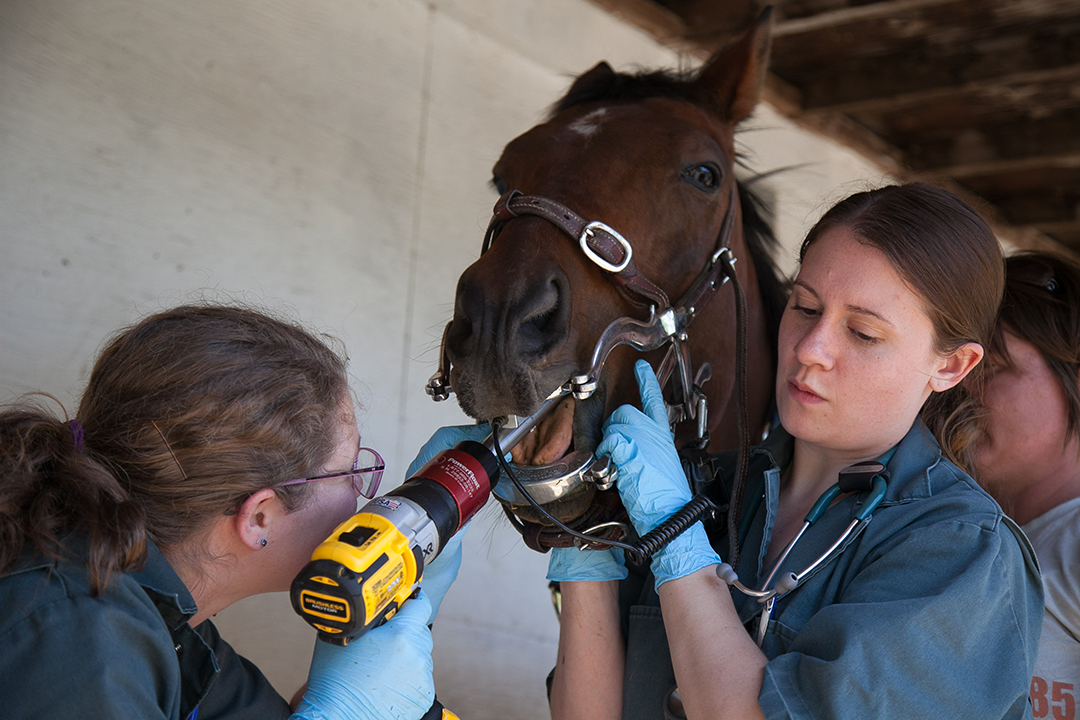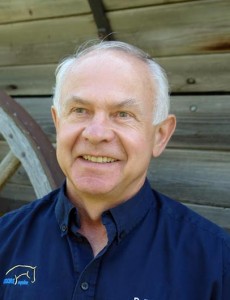
The vet behind the PowerFloat
Ask any horse owner or equine veterinarian about the PowerFloat, and they’ll tell you that the rotary dental instrument is synonymous with equine dental care — an essential tool that’s well known in the horse community.
By Lynne Gunville
The PowerFloat was the brainchild of Dr. Dennis Rach, a Calgary-based large animal veterinarian who has always liked solving problems.
Rach has been practising veterinary medicine since 1970, and he still loves his job – the animals he treats and the people he meets. As he points out, he’s happiest when he’s driving around the Alberta countryside on farm calls.
“I think a large animal practice is kind of fun,” says Rach. “I’m primarily a country call person. I get to do a whole variety of things every day, and I’m lucky because I get to deal with people who have a livestock or animal background and are knowledgeable.”
Rach grew up on a mixed farm north of Calgary, Alta., but he wasn’t sure what to do with his agricultural background until he watched the local veterinarian conduct a post mortem examination on a steer. Greatly impressed by the science involved, Rach decided veterinary medicine was the career for him.
After his graduation from the Western College of Veterinary Medicine (WCVM) in 1970, Rach was the third veterinarian hired at Moore and Sturm Veterinary Clinic, a large animal clinic that served the Calgary area.
Today he’s a partner in the highly esteemed practice, now named Moore Equine Veterinary Centre. While Rach is a certified equine chiropractor and certified equine acupuncturist, he’s best known for his skill in equine dentistry — an area that’s always been a special interest for him.
“I always tried to do a good job doing dentistry,” says Rach. “The horse has to eat, and its teeth are extremely important, so I never took the easy route, even in the day when you hand floated and it was hard work. I hand floated for 25 years.”
Over the years as he ran into difficult cases, Rach began to look for an alternative to the equine hand float – a tool that could cause soft tissue damage and premature loosening of the teeth. When he encountered a very skinny mare with a mouth that “looked like the Rocky Mountains,” Rach set his problem solving skills to work.
Rach borrowed a rotary tool from a machine shop, constructed a plastic guard for it and successfully floated the mare’s teeth in just a few minutes.
With that success under his belt, Rach made further improvements to the tool and had a stainless steel guard made for it. As other veterinarians heard about his device, they began to put in orders for the tool, and Rach’s invention became known as the Rach Grinder.
But Rach wasn’t satisfied yet. After several years of modifying and improving the tool, he patented and then introduced his product, the PowerFloat, at the annual meeting of the American Association of Equine Practitioners (AAEP) in 2000.
Although the initial reaction of the practitioners was lukewarm, the PowerFloat proved to be a huge hit at the AAEP’s trade show the following year.
“It was like selling hot dogs,” Rach recalls. “There were so many people lined up to get into the booth that I went to lunch and couldn’t get back in.”
Rach created PowerFloat, a company that now includes four full-time employees and uses machine shops in Calgary, Ontario and Nevada. The product is distributed by veterinarians in North America as well as Australia, Mexico, Europe and Chile.
While Rach enjoys his role as “the R and D guy” and is continuously inventing more products aimed at improving equine dentistry, he particularly relishes the chance to conduct wet labs aimed at teaching how to use the PowerFloat.
“We go to places that have rescue horses or something where they’re not getting their teeth done otherwise, and the whole place gets their teeth done for nothing,” Rach explains. “It’s very gratifying to see the confidence of the veterinarians change. They’ll take six horses, and they’ll go from being tentative and not very confident to getting extremely confident by the time they leave. That’s what I find exciting.”
While his business keeps him busy, Rach still enjoys his role as a large animal veterinarian. Although half of his time is spent treating lameness, he finds dentistry work to be the most rewarding aspect for him.
“You can look in the mouth and see a mess, and you can just fix everything and make the horse a lot better,” Rach explains. “You can walk away every time and know that you’ve helped the horse. It’s immediate satisfaction.”
As Rach has developed new techniques and tools to improve equine dentistry, he’s endeavoured to share his knowledge by working with students at the WCVM as well as the veterinary schools in Calgary and Guelph. He’s also helped create the International College of Veterinary Odontology, a networking information society aimed at increasing and passing on knowledge about equine dentistry.
Although he still enjoys working six days a week, Rach has slowed down in the last year. He took some extra time off last winter to travel with his wife Diane, who recently retired from her career as a midwife. The couple have three grown children.
As Rach looks back over a career that has spanned five decades, he observes that veterinary medicine is a humbling experience where you’re just trying to work on things and make them better, and it’s an uphill battle in many cases.
He’s proud that the veterinary profession has made so many advances in dentistry over the past 20 years, and he feels a deep satisfaction that he was able to contribute to those advancements.
“Developing the tool [PowerFloat] was something that I couldn’t let go of. There was a problem, and I couldn’t let it go until I’d solved it. Seeing things get better is really important to me. And I think that’s the really rewarding part of being a veterinarian — when you go out and look at an animal and there’s something wrong and you can correct it.”
Dr. Dennis Rach will be speaking at the 2018 Saskatchewan Equine Expo. Visit the Saskatchewan Equine Expo site.
Lynne Gunville is a freelance writer and editor whose career includes 25 years of teaching English and communications to adults. She and her husband live at Candle Lake, Sask.
